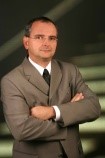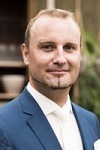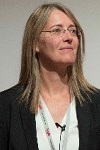g.tec medical engineering GmbH & Guger Technologies OG, Austria
g.tec medical engineering GmbH & Guger Technologies OG, Austria
MEQNordic A/S, Denmark
University of Applied Sciences and Arts Dortmund, Germany
Lately, Brain Computer Interface (BCI) systems become increasingly used in the context of stroke rehabilitation. Many BCI systems are based on motor imagery activity recorded from the sensorimotor cortex, which is translated into continuous control signals for rehabilitation devices.
The tutorial will review current stroke rehabilitation using BCI technology and will provide insight into technology, experimental setups, results and outcomes of patient studies.
Some patients diagnosed as vegetative are reclassified as (at least) minimally conscious when assessed by expert teams. A further subset of potentially communicative non-responsive patients might be undetectable through standard clinical testing. Other patients might have transient periods of relative wakefulness, but remain unaware of their surroundings. The tutorial will provide an overview of BCI technology to identify non-responsive patients that might be able to communicate and use the technology as an assessment tool.
General principles of BCI for stroke rehabilitation, coma assessment and communication will be explained, so the audience will get an inside in the topic.
Further participants will be able to understand the target patient group. Participants will learn about state-of-the art in BCI stroke rehabilitation, coma assessment and communication.
Main content:
The goal of the tutorial is to bring together researchers and interested attendees, to describe and demonstrate the options available in the field of Brain Computer Interfaces. We will highlight the usability and reliability of BCI control, which now allows developing and displaying more advanced applications. We think that such a tutorial will be very appealing to audience members working in the area of HCI combining different modalities for interactions, including the medical field.

Dr. Guenter Edlinger studied control engineering at the University of Technology Graz and carried out research work at the Institute of Biomedical Engineering (Prof. Pfurtscheller) at the University of Technology Graz. He worked there as an assistant professor and teacher and received his PhD degree in 1998. The topic of his PhD work was the design of High-Resolution EEG systems. He is co-founder of g.tec. He has been responsible for R&D with special emphasis on the development and production of medical systems for over 20 years.

Alexander Lechner studied technical mathematics and bioinformatics at the Johannes Kepler University in Linz, Austria. His master thesis treats development of a support vector machines. Since 2011 he works in sales for g.tec medical engineering GmbH, based in Austria. The company develops hardware and software for biosignal acquisition and analysis. Alexander Lechner is also part of EU-funded projects. Alexander is field expert and specialist for BCI based applications in the medical field especially used in rehabilitation of stroke patients and in the assessment of disorders of consciousness patients.

Torben Fuglsang is an electrical and electronics engineer and has almost 30 years of experience with sales and servicing of medical equipment. Together with g.tec he helps researchers in the Scandinavian area to get proper equipment for their BCI research. Torben trains people on BCI based applications in the research and medical field.

Professor Natalie Mrachacz-Kersting received her PhD in Biomedical Science and Engineering from The University of Aalborg, Denmark in 2005 and held several post-doc positions at the University of Auckland, New Zealand and Aalborg University, Denmark. From 2007 she was Associate Professor at the Center for Sensory-Motor Interaction, Aalborg University, until she moved to the University of Applied Sciences and Arts Dortmund, Germany as Full Professor in Neuroscience and Medical Technologies. Her research focuses on neurorehabilitation technology, and neural control of movement. Within these areas, she has (co)-authored approximately 70 papers in peer-reviewed Journals and >150 conference abstracts and papers. She was the recipient of the International Award in Brain-Computer-Interfaces in 2017 and has received several prestigious grants from the Innovation Fond of Denmark, Kong Christian den Tiendes Fond, Lundbeck Fond and the Obel Family Foundation of Denmark. She is currently Associate-Editor of several journals including Brain-Computer-Interfaces, the Scandinavian Journal of Medicine and Science in Sports and Brain-Computer Interfaces - specialty section of Frontiers in Human Neuroscience.